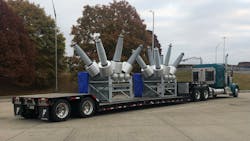Most fleets have very little contact with their electric utility company. Sure, they get a monthly bill for the electricity they use at their various locations, but it is unlikely that they have a contact within the utility with whom they speak on a regular basis.
And that has worked fine for many years, but as fleets begin to deploy electric trucks and even trailers, the relationship between the fleet and their electric utility provider has got to change. For the successful deployment of electric vehicles more cooperation between the two is needed.
Fleets are going to have to work more closely with their local utilities in order to have a smooth transition to electric vehicles. The sooner fleets begin having conversations with their utility provider(s) the better. Fleets need to be prepared to educate utility company personnel about the trucking industry and about their own operating conditions. And both fleets and utilities are going to have learn some different definitions for words like “load” and “transmission.” Each has a very different definition for these two!
See also: The zero-emission vehicles are coming—and fleets are gearing up
When a fleet adds one or two electric vehicles, the existing power at a site is probably adequate to charge those vehicles, but as the fleet adds more electric vehicles, existing power will quickly become inadequate and additional power will have to be brought to the site.
Depending on the need and the site itself that can take months or even years—so it is imperative that the utility be brought into the conversation early. This will ensure that there will be power to charge the trucks once they begin to arrive in large numbers.
There are more than 3,000 electric utilities in North America and no two are exactly alike, so there is no blueprint for the right way to engage with a given utility. The best advice, again, is to start the engagement early. Don't worry about engaging the utility too early. Given the need for site assessments, construction times, etc. this is one of those times when sooner is better than later.
Also keep in mind that some utilities are more attuned to developments in the trucking industry and may have people dedicated to truck electrification projects. Unfortunately, not all utilities have assigned staff to work with fleets on upgrading their electric power to accommodate batty electric vehicles and that will slow the process down further.
See also: Electric utilities have a real thirst for knowledge
Fleet electrification is not going to take place without cooperation between fleets and utilities. It is up to fleets to make the first overture and the sooner they do so the smoother the process is likely to go.
While the task can seem daunting, we hope the first session in our 10-session Electric Depot Bootcamp will bring some clarity to the issue. Join us April 25 at 1 p.m. ET for a session on Best Practices for Utility Fleet Relationships. Speakers include:
- Jennifer Deaton, manager of corporate strategy and electrification, Oncor
- Ramiro Lepe, medium and heavy duty transportation electrification senior advisor, Southern California Edison
- Ken Marko, fleet sustainability senior manager, US Foods
- Paul Gioupis, co-founder and CEO of Zeem Solutions
You can register for this session and the other nine here. If you can't make the session, a recording will be available on our website, and I will be blogging in this space on the keys to getting to a great relationship with your local utility.
Michael Roeth has worked in the commercial vehicle industry for nearly 30 years, most recently as executive director of theNorth American Council for Freight Efficiency(NACFE). He serves on the second National Academy of Sciences Committee on Technologies and Approaches for Reducing the Fuel Consumption of Medium and Heavy-Duty Vehicles and has held various positions in engineering, quality, sales, and plant management with Navistar and Behr/Cummins.
About the Author

Michael Roeth
Executive Director
Michael Roeth is the executive director of the North American Council for Freight Efficiency. He serves on the second National Academy of Sciences Committee on Technologies and Approaches for Reducing the Fuel Consumption of Medium and Heavy-Duty Vehicles and has held various positions with Navistar and Behr/Cummins.
